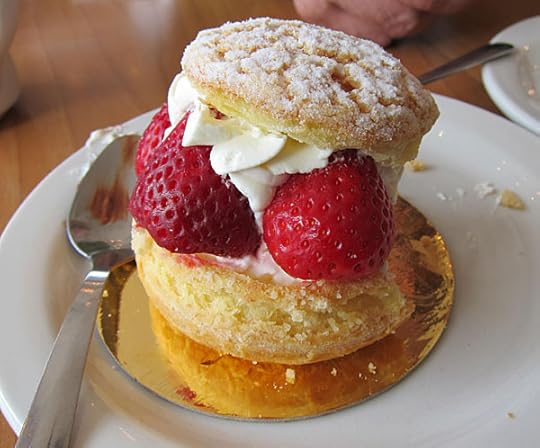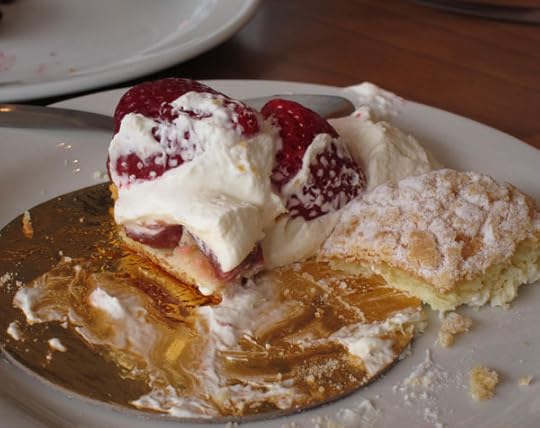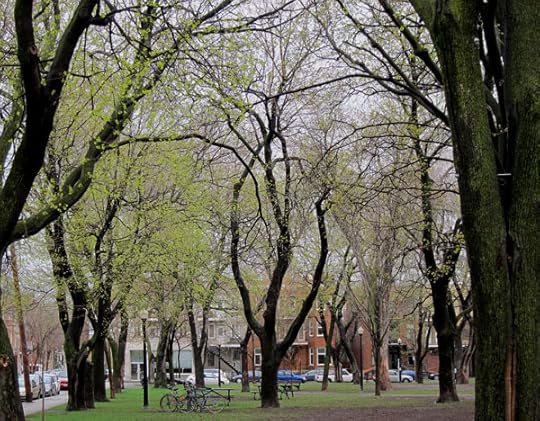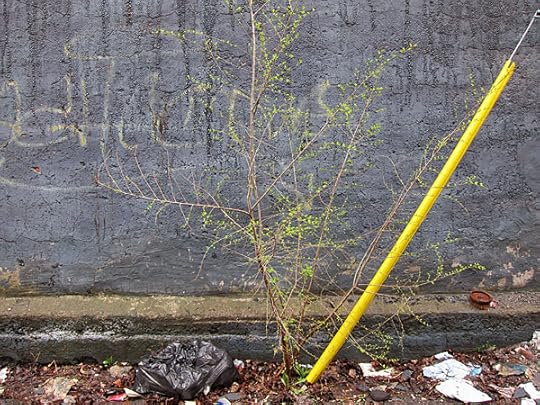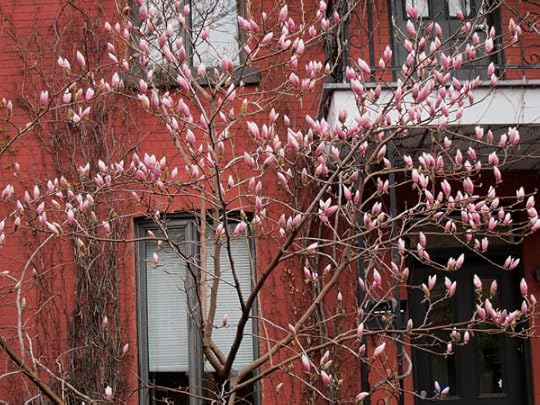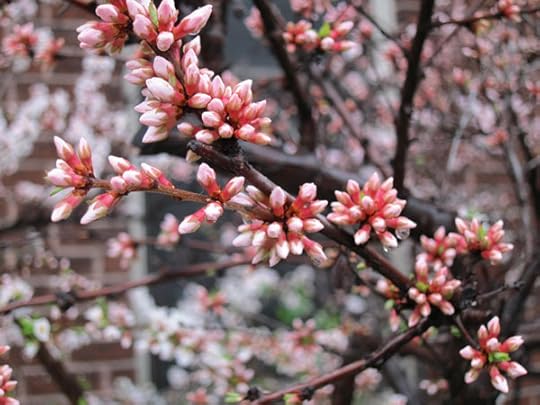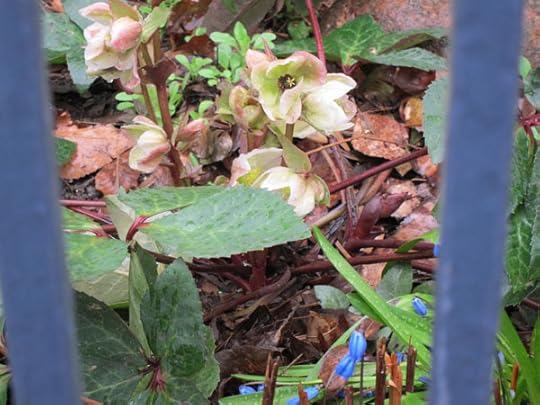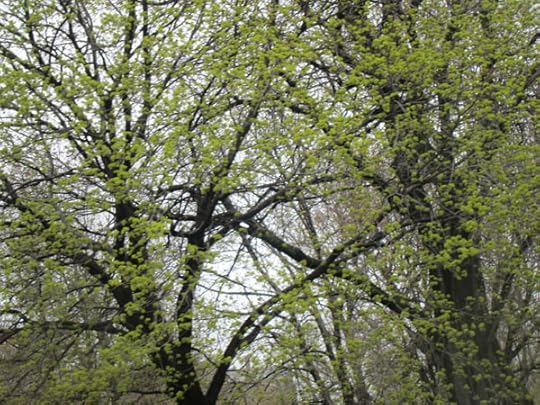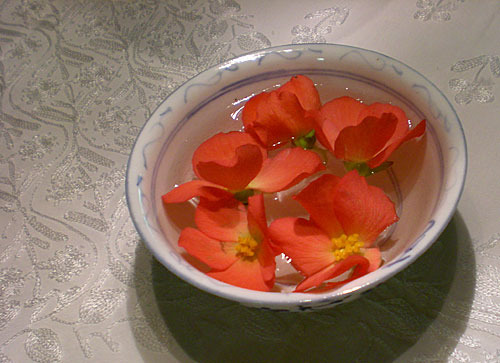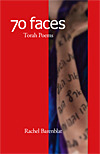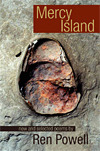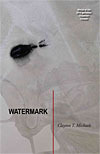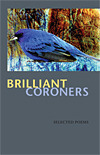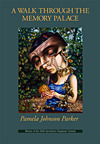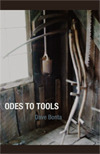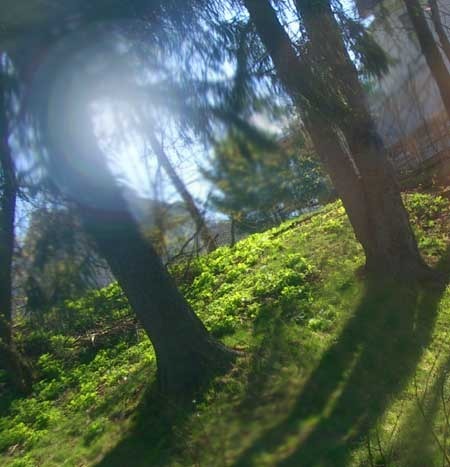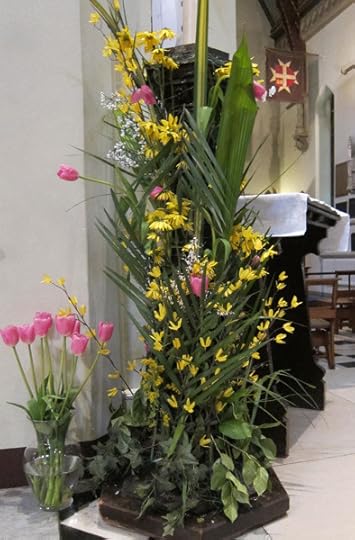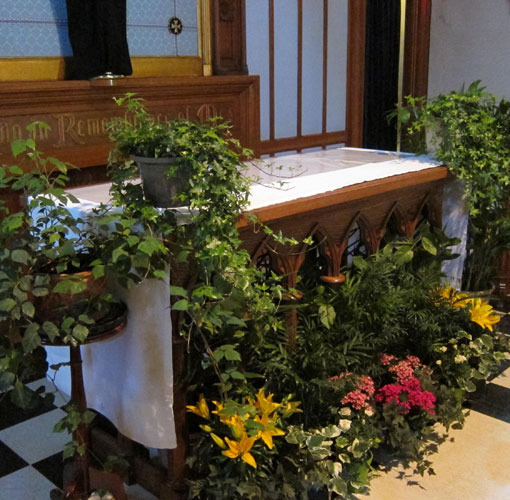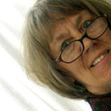Elizabeth Adams's Blog, page 118
May 9, 2011
Sweetness
My friend Rachel Barenblat, the Velveteen Rabbi, was here this weekend to do two book tour events for 70 Faces: Torah Poems, one of which was a talk we did together at the cathedral yesterday after the service. It was a glorious day, and Mother's Day besides, so I was convinced few people would come - but I was wrong, and we had a good turnout of enthusiastic and interested participants. It had been a lot of work to put it all together (including planning and making one of those loaves-and fishes lunches for a group of undetermined size) but all went well. Afterward we went back to our apartment and out for a walk with coffee and pastries as our goal. It's Montreal, after all!
We ended up in front of the enticing display at Première Moisson on Blvd. Mont-Royal. Since there were three of us, we chose three different desserts: the whipped cream/cream puff/strawberry tower shown here; a small tart made like the famous Quebec sugar pie, but with maple sugar; and a slice of chocolate mousse cake with dark chocolate crust and a raspberry layer. And, of course, some strong coffee.
Several hundred calories later, we buzzingly stepped back outside.
It was wonderful to see Rachel in person. We've known each other for eight years online, and I've recently published her book, so there have been Skype video calls and lots and lots of emails, but we've only gotten together in person three times. We went back to the apartment, talked a lot, drank some red wine and ate some gravlax, and late in the evening went out to a neighborhood bistro for a very simple meal of burgers and salad, mussels and frites, and talked some more, all the way home.
This morning Rachel headed back to her home and family in southern New England, and we went back to our studio and a cat who needed some quality attention after being somewhat low on the totem pole this weekend.
I was hyper-aware, yesterday morning, of all the things we do and say during our formal Christian liturgy that must be strange or even offensive to Jews. Because I was hearing and seeing everything through a different lens than usual, it made me realize how much I'm usually on auto-pilot, NOT paying attention to such things, and also how -- it being right after Easter -- all the people in the lessons and in the sermon - including Jesus, of course - were Jews still practicing their faith in the same basic way as Rachel. Everything that is typically "Christian", from the stained glass and vaulted arches to the liturgies and creeds, has been added on over the centuries as the two commmunities diverged further and further. As I've often thought before, it's hardly a question of "what would Jesus do," but rather "what would he THINK?" And there was my friend, sitting next to me, singing the hymns, reciting the psalms, watching baptisms, and praying the prayers, but carefully leaving out any lines that she couldn't say with integrity and being enormously appreciative and respectful. Yet her religion is there, where we left Jesus and the disciples before Easter, and I'd never quite realized it so strongly before
As I think back over a very busy weekend, I'm appreciating many moments and many conversations. One of the best was essentially wordless, though: standing next to Rachel in the vast space of the cathedral, sharing a hymnbook and singing together for the first time. She has a lovely voice, which I knew, but I didn't know she used to sing in a Renaissance group. On the third hymns she dropped down to the alto part while I sang soprano. I relaxed then, and realized there was no need to be uncomfortable. We're real friends, and friends manage to find the common ground.
May 5, 2011
La Tendresse
May 4, 2011
From Eelskins to Glaciers: a Month of Poetry
Here we are, well into the first week of May, and I'm admitting to myself that I barely wrote anything in April - National Poetry Month - about poetry.
First of all, I have to tell you I kind of object to these arbitrary observances, which strike me as only one step away from Hallmark holidays but guiltily induce us all to somehow "get on board." I think it's sad that we have to have a time set aside for remembering a major art form that ought to be part of everyday life. Be that as it may, what I found myself doing this April -- and I'm a poetry publisher and editor, after all -- was not reading a book of poetry every day, or every week; not writing a poem a day; not writing a series of blog posts about poetry. What I did was to try to notice the poetry around me. Where did I find it in my life, besides the obvious and usual places? What poems seemed to penetrate through the incessant blur of words and stay with me?
I read Seamus Heaney's latest book, "Human Chain," and was blown away by a longish poem in it called "The Eelworks," about Heaney's courtship of his wife: visceral imagery and emotion as strongly remembered as the smell of the eelworks itself:
That skin Alfie Kirkwood wore
at school, sweaty-lustrous, supple
and bisected into tails
for the tying of itself around itself –
for strength, according to Alfie.
Who would ease his lapped wrist
from the flap-mouthed cuff
of a jerkin rank with eel oil,
the abounding reek of it
among our summer desks
my first encounter with the up close
that had to be put up with.
At qarrtsiluni, where the "translation" issue has been unfolding, I discovered for the first time - among many other wonderful works - the poetry of Blaise Cendrars, through Dick Jones' translations of two poems.
The lines we sang in church last month that stayed with me the most, among all the psalms and hymns and motets and scripture passages, were Christopher Smart's, used by Benjamin Britten in his cantata "Rejoice in the Lamb." Smart was a 16th century poet of "brilliant but unbalanced mind" who was eventually confined to an asylum. Smart believed that all creation is continually praising God, and in Britten's piece, there are three long solos about the cat, the mouse, and the flowers -- and how they praise God in their movement and their beauty. The rest of the text, too, has everything from tigers to musical instruments to letters of the alphabet exulting God: marvelous, crazy words and ideas, refusing to confrom to societal expectations. I loved it. An excerpt:
For I will consider my cat Jeoffry
For he is the servant of the Living God duly and daily serving him.
For at the first glance of the glory of God in the East he worships in his way.
For this is done by wreathing his body seven times round with elegant quickness.
For then he leaps up to catch the musk, which is the blessing of God upon his prayer.
For he rolls upon prank to work it in.
For having done duty and received blessing he begins to consider himself.
For this he performs in ten degrees.
For first he looks upon his forepaws to see if they are clean.
For secondly he kicks up behind to clear away there.
For thirdly he works it upon stretch with the forepaws extended.
For fourthly he sharpens his paws by wood.
For fifthly he washes himself.
For sixthly he rolls upon wash.
For seventhly he fleas himself, that he may not be interrupted upon the beat.
For eighthly he rubs himself against a post.
For ninthly he looks up for his instructions.
For tenthly he goes in quest of food.
For having consider'd God and himself he will consider his neighbour.
For if he meets another cat he will kiss her in kindness....
In April we heard or read a number of poems by John Donne, and I remain stunned by them.
I also read or re-read a number of poems by friends. In the collection Brilliant Coroners, I was again struck by Dale Favier's wonderful "Santiago," and Teju Cole's "Crazy Kev." I re-read Kristen McHenry's remarkable chapbook, "The Goatfish Alphabet," and once again marvelled at my favorite poem in it, "Touring the Glaciers." I read a new manuscript by Nic Sebastian, and one by Khadija Anderson, both of which I hope will be available soon for everyone to read. And I thought about Clive Hicks-Jenkins' upcoming retrospective in Wales, where my colleague and friend Dave Bonta will be one of six poets reading from a collection of poems written in respnse to Clive's paintings.
And I planned for this weekend's event with The Velveteen Rabbi, Rachel Barenblat (70 Faces: Torah Poems) here in Montreal: called "Modern Women, Old Testament: A Jewish-Christian Conversation," where I'll be talking to Rachel about her book and how poetry and the ancient Jewish tradition of midrash can combine with feminism and contemporary thought to help modern readers respond to these old but often-problematic texts -- many of which are poetic themselves. (Please come if you're in town! Everyone's welcome.)
So: a month of less-is-more, but full of poetric riches that are already spilling over into May.
May 1, 2011
What makes a place sacred?
Vermont woods in the spring
The comments on the "Time Travel" post a few days ago, and some recollections from the Ecotone Wiki, indicate that others have felt what I did upon returning to my former home; they've also felt a keen disconnection and loss when places that were important to them have changed or disappeared. Thinking about my own reactions I realize there was a lot about this last visit that remained unvoiced - even in my own head - and that some of this involves places to which I had a deep or persistent connection but either didn't, or didn't want, to visit.
I think there is a sacredness about certain places in our lives, a sacredness we perhaps don't admit and seldom talk about. More than the obvious corporate or public ones, from places of worship to natural spots that others agree are unique or special, I'm talking about private spots that somehow become "ours" over time. For me, there was my Vermont garden -- which I definitely do not want to visit or even see, now that it belongs to someone else. There was my studio/meditation space, a private room of my own where I meditated, drew and painted, wrote on the walls, thought, cried. There was our bedroom, and spaces in our living area where particularly important conversations took place or memories were formed, sometimes involving people now gone. There was the hilltop where J. and I were married. And there were a few favorite spots on a wooded hillside laced with public walking trails, but those I think I could visit again without feeling any pangs.
Most of the public places I frequented have already changed so much - and so much for the worse - over the three decades of suburbanization during which I lived there, that the grief I felt is mostly gone now.
It's odd for me to realize how much of the sacredness of a particular place has to do with pilgrimage - it needs to be a place to which I've returned again and again - and how it can be very large: a view across hills toward larger mountains, for instance; or very small: a corner of a room, or a shelf holding particular, chosen objects that I've looked at for years during meditation or deep thought. Over time, the place we visit or create becomes, somehow, consecrated by those thoughts and our own presence, so that if it were destroyed we would feel something had been not merely destroyed but desecrated. These feelings can be so intimate, so private, and so subterranean that we barely admit them even to ourselves. Why? Because what we bring to those spaces is the deepest part of ourselves, the part that I think is inextricably intertwined - even indistingishable- from the divine. Some say this is where they meet God; some don't use that language. I would call them liminal spaces where the borders between holiness and ordinariness are the most porous, the most blurry. At the most mystic level, this is where we can no longer tell where "we" end and "the holy" begins.
Perhaps the reluctance to return to our "old" places is because we fear desecration, loss, and grief, and we don't want to be caught in these feelings by others, especially those who still live there and may not feel the same way at all, because the emotions are so very private. We may even experience other people's lack of understanding about these emotions as another kind of desecration.
It's easier, maybe, to find our own secret places in rural areas; I've had such places since I was a child, but not so much since moving to the city. The good thing about moving, though, has been the realization that I can carry them with me inside.
The intimacy of sacred space
The comments on the "Time Travel" post a few days ago indicate that others have felt what I did, returning to my former home, and also felt a keen disconnection and loss when places that were important to them have changed or disappeared. Thinking about my own reactions I realize there was a lot about this last visit that remained unvoiced - even in my own head - and that some of this involves places to which I had a deep or persistent connection but either didn't, or didn't want, to visit.
I think there is a sacredness about certain places in our lives, a sacredness we perhaps don't admit and seldom talk about. More than the obvious corporate or public ones, from places of worship to natural spots that others agree are unique or special, I'm talking about private spots that somehow become "ours" over time. For me, there was my Vermont garden -- which I definitely do not want to visit or even see, now that it belongs to someone else. There was my studio/meditation space, a private room of my own where I meditated, drew and painted, wrote on the walls, thought, cried. There was our bedroom, and spaces in our living area where particularly important conversations took place or memories were formed, sometimes involving people now gone. There was the hilltop where J. and I were married. And there were a few favorite spots on a wooded hillside laced with public walking trails, but those I think I could visit again without feeling any pangs.
Most of the public places I frequented have already changed so much - and so much for the worse - over the three decades of suburbanization during which I lived there, that the grief I felt is mostly gone now.
It's odd for me to realize how much of the sacredness of a particular place has to do with pilgrimage - it needs to be a place to which I've returned again and again - and how it can be very large: a view across hills toward larger mountains, for instance; or very small: a corner of a room, or a shelf holding particular, chosen objects that I've looked at for years during meditation or deep thought. Over time, the place we visit or create becomes, somehow, consecrated by those thoughts and our own presence, so that if it were destroyed we would feel something had been not merely destroyed but desecrated. These feelings can be so intimate, so private, and so subterranean that we barely admit them even to ourselves. Why? Because what we bring to those spaces is the deepest part of ourselves, the part that I think is inextricably intertwined - even indistingishable- from the divine. Some say this is where they meet God; some don't use that language. I would call them liminal spaces where the borders between holiness and ordinariness are the most porous, the most blurry. At the most mystic level, this is where we can no longer tell where "we" end and "the holy" begins.
Perhaps the reluctance to return to our "old" places is because we fear desecration, loss, and grief, and we don't want to be caught in these feelings by others (who don't feel the same way at all) because the emotions are so very private. We may even know (also, perhaps, without saying so aloud) that we experience other people's lack of understanding about these emotions as another kind of desecration, too.
April 29, 2011
Last Call for National Poetry Month Sale at Phoenicia
My micropress, Phoenicia Publishing, has been running a 15% off sale in honor of National Poetry Month. So if you've been thinking of buying one of our poetry titles, there are two days left in which to take advantage of the special prices. Online store orders only (not Amazon) and this sale doesn't include the print editions of qarrtsiluni issues. Details are on the Phoenicia website. We really appreciate your support, and so do the authors!
Coming later in 2011: the winner of this year's not-yet-announced qarrtsiluni chapbook contest, and Marly Youman's Thaliad, a book-length, post-apocalyptic narrative poem written in blank verse. And I hope to make the exciting announcements of two other forthcoming titles for early 2012, in the near future!
April 28, 2011
Time Travel
E. and H.'s backyard, 2006
For the past couple of days we've been in our former haunts of Vermont and New Hampshire, visiting friends and family. Very nice, the visiting part. Strange, the being-there-again part. Everything completely familiar, and yet...I am not the same person who used to live there. I moved through the old places with all the familiarity of a longtime resident, but felt somehow unreal -- like a ghost -- watching a place, people, and activities I was once part of, but am no longer. There was no wistfulness at all; I live elsewhere now. It was a relief to feel this, but it was decidedly strange.
The unreality was compounded by the fact that we were staying in a motel, only a few miles from our former house. One of the people we visited was my sister-in-law, now living alone in the house she shared with her now-deceased husband; during most of those years my in-laws were also still alive, and often with us when we gathered for a family meal. There we were, together, talking about her study of Arabic and what her father would have thought of it, and eating olives and lamb and baklava, with nearly everything else about our small family entirely changed.
We had come down particularly to see a close friend and former neighbor who has moved back to her native Iceland. She was also staying in a motel, and having some memory lapses about what used to be where, so we were called upon to give directions when in the car; in the hotel suite we cooked and ate together as we often had, but not, of course, in our houses that had been next door to each other. And her child, watching tv in the next room, now eight years old and competently bilingual, was herself the stuff of many memories beginning when she herself was only a wish; when they left for Iceland she had been only two.
It felt, therefore, like several different layers of reality and removal were operating at once, and without the ground itself to touch -- my garden, the woods I used to roam in -- we passed through the few days as if in a dream, and now, back in my own home and studio, I feel a slight doubt that we were there at all.
April 26, 2011
Happy Easter, Happy Spring (I hope!)
I'm away for a couple of days (and still recovering from last week's marathon) but wanted to post this picture of the "Easter garden" - a sign of hope for us up here in the north. I'm in the country right now, where the willows are golden and the red maples full of fat buds. I fell asleep last night listening to spring peepers in a nearby pond, which is a sure sign that nature is proceeding according to plan, even if there were snowflakes in the air a few days ago.
Back soon...
April 24, 2011
Rejoicing with Britten
Happy Easter Morning!
Our Evensong is a special one today, both for the sake of Easter and the sake of poetry. We're performing the cantata "Rejoice in the Lamb" by Benjamin Britten, set to texts by the brilliant and perhaps mad 16th century English poet, Christopher Smart along with some other terrific pieces. The postlude will be the La Resurrection du Christ by Olivier Messiaen.
Here's the whole program, hope you can join us on Radio Ville Marie for the live-streamed broadcast at 4:00 pm EST.
Easter Day 2011 Choral Evensong
The Cathedral Singers
Prelude: Sarabande for the Morning of Easter [Webster: listen], Herbert Howells (1892-1983)
Introit: Jubilate in C [text/listen], Benjamin Britten (1913-76)
Preces and Responses: Paul Halley (b. 1952)
Psalm: 114, 150 (Tonus Peregrinus, Stanford)
Canticles: Chichester Service [Rochester: YouTube], William Walton (1902-83)
Anthem: Rejoice in the Lamb [text/listen] Benjamin Britten
Postlude: La Résurrection du Christ from Le Livre du Saint-Sacrement [Latry: YouTube], Olivier Messiaen (1908-1992)
April 23, 2011
Waiting
Holy Saturday.
A day of suspension, and of waiting. Merton writes that on this day "the confusion of sorrow and joy is so complex that you never know where you are."
Yesterday we thought about ourselves individually, and ourselves as a species: our legacy of wars, hatred, waste, greed, senselessness and impatience, our selfishness, our lack of care for the future. The mind revolts: "But I try, I'm not a bad person!" And yet it's all around us, the evidence, the history, the news of today. And yet, in spite of all that -- Easter, a new beginning, is tomorrow. If there is one thing common to all human beings it's this capacity to hope, and to love.
It's hard though: hard to know where to begin, and hard to find the strength to act. If all we can feel is helpless, overwhelmed, and sad, then we can't be of much help to ourselves, let alone anyone else.
I've been touched this week by some of your comments and some letters I received from readers who wanted to say something privately. It means a lot to me that these posts haven't been rejected. It frustrates me to know that every one of us is, at our core, a spirtual being who longs for beauty, truth, hope, joy, and love -- but so many have been shut out by (or have deliberately left) religious institutions with their dogmas and creeds, their expectations of blind obedience, their cruel exclusions, their hierarchies and patriarchies, their wealth, and even their abuse of the most vulnerable. Some of us have turned to other paths. But more and more people today simply deny their own spirituality, and spend their entire lives in this sort of Saturday limbo, suspended between sorrow and a joyful serenity we want, but that -- except for the occasional transcendent moment -- always feels just out of reach.
Why do we find this so difficult to talk about? It's almost the last taboo at the dinnertable, worse than sex or money, for sure. Maybe writing more openly about these subjects can help open a window into a spaciousness where questions are allowed, where the fullness of each of us -- as we are, not as we feel we "ought" to be -- is allowed. I'm talking about a private space, a permission we give to ourselves, even more than a blog as a place of discussion. I think we all need a place where we can bring our doubts and hopes and faults and sorrows and the things that make us happy -- and just breathe out and in.
And then maybe say, tentatively, "If you are there, I am here."
That's all it takes, to begin, but it was one of the largest leaps I ever made. I still remember where I was and when it happened, many many years ago, when I finally gave up trying to do it all on my own. It's difficult to make that move in our hearts when we're adults, especially intellectual adults. Even terrifying. But on the other side of that movement -- on the other side of Saturday -- lies a different world which is, and has always been, waiting for us.

